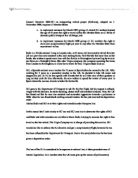What is the meaning of the term 'measure equivalent to a quantitative restriction' for the purposes of Article 28 EC?
Samantha Nicholson Seminar Leader - Harm Schepel European Law - LW511 What is the meaning of the term 'measure equivalent to a quantitative restriction' for the purposes of Article 28 EC? Article 28, whilst appearing relatively clear on first reading, has proved problematic and therefore produced a string of case law and discussion, which continues on today. The Article states "Quantitative restrictions on imports and all measures having equivalent effect shall be prohibited between Member States.".1 This initially seems very clear in its implication. No Member State can restrict the quantity of imports from other member states. It is in the second part, the measures having equivalent effect (MEQR's) that the problems arise. In order to define the term 'measure equivalent to a quantitative restriction' one needs to trace the problems and decisions arising from this issue. This can be discussed in three different sections. Firstly, the definition of an MEQR as it stood in the cases prior to Keck2, and Directive 70/50. Secondly the changes created by the decision in Keck and other cases which followed this judgement. Finally, there are the decisions post Keck, and the fact that they have largely regressed to the decisions taken before this case. MEQR's can essentially be split into two categories; those that directly or indirectly discriminate against imported goods, and
Council Directive 2004/707 on transporting retired people (fictitious), adopted on 1 November 2000, requires all Member States: a. to implement measures by March 2007 giving all retired EU workers beyond the age of 65 years the right to travel within the
Council Directive 2004/707 on transporting retired people (fictitious), adopted on 1 November 2000, requires all Member States: a. to implement measures by March 2007 giving all retired EU workers beyond the age of 65 years the right to travel within the Member State on all forms of domestic public transport free of charge; and b. to implement measures by March 2008 giving all EU workers the right to claim one complimentary flight per year to any other EU Member State from any national airline. Sadie is a Polish national living in London who, at 65 years old, has recently retired from her job as a part-time care assistant in the local nursing home. Now that she has more time on her hands, she wishes to spend more time with her family in Birmingham by travelling by train to see them on a fortnightly basis. She asks Virgin company, the company operating the trains from London to Birmingham, to allow her to travel for free. Virgin refuses to do so. Bill, a Spanish national was a teacher for 15 years in Spain before he moved to the UK. After working for 3 years as a secondary teacher in the UK, he decided to take life easier and stopped his job. At 55, he has agreed with friends that he will take care of their gardens as long as they cook for him afterwards. He now wishes to spend the winter of every year in Spain where the warmer climate is better for his health. Bill goes




